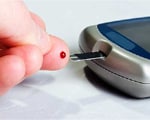Just a sleepless night can hamper the body's ability to use insulin to process sugar in the bloodstream.

Type 2 diabetes is caused by the body's inability to adequately use insulin, a hormone produced by the pancreas to control glucose sugar produced from food. Sugar levels rise and can damage the eyes, kidneys, nerves, heart and major arteries. Previous studies have shown that several nights of poor sleep can result in impaired glucose tolerance but the effect on insulin sensitivity.
To evaluate the effect of a single night of partial sleep restriction on insulin sensitivity, Dutch researchers examined nine healthy people (five men, four women) - once after a night of eight hours sleep and once after a night of just four hours sleep.
Sleep characteristics were assessed by polysomnography while insulin sensitivity was measured using radio-labeled glucose in clamp study. They found that sleep restriction did not affect basal levels of glucose, nonesterified fatty acids, insulin, or endogenous glucose production. It, however, resulted in increased endogenous glucose production during the clamp study indicating resistance to insulin action by the liver and decreased rate of glucose disposal reflecting decreased peripheral insulin sensitivity.
The findings indicate that sleep deprivation during only a single night induces insulin resistance in multiple metabolic pathways involved with control of blood sugar in healthy subjects and this may explain the variation in glucose regulation seen in patients with type 1 and type 2 diabetes.
DoctorNDTV is the one stop site for all your health needs providing the most credible health information, health news and tips with expert advice on healthy living, diet plans, informative videos etc. You can get the most relevant and accurate info you need about health problems like diabetes, cancer, pregnancy, HIV and AIDS, weight loss and many other lifestyle diseases. We have a panel of over 350 experts who help us develop content by giving their valuable inputs and bringing to us the latest in the world of healthcare.












